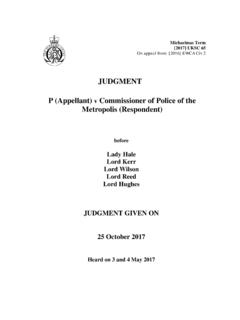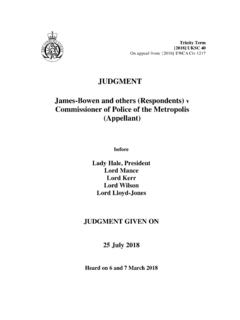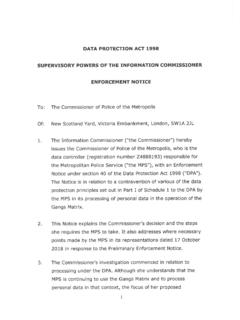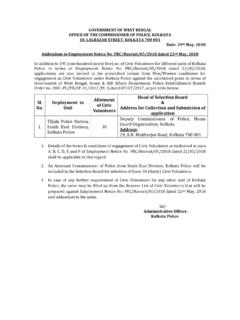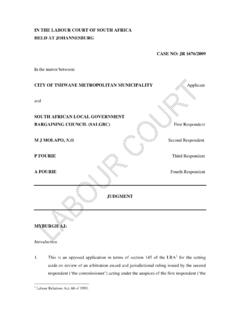Transcription of IN THE SUPREME COURT OF APPEAL OF SOUTH AFRICA …
1 IN THE SUPREME COURT OF APPEAL OF SOUTH AFRICA JUDGMENT CASE NO: 485/2012. Reportable In the matter between: NATIONAL COMMISSIONER OF THE SOUTH AFRICAN. POLICE SERVICE First Appellant NATIONAL DIRECTOR OF PUBLIC PROSECUTIONS Second Appellant and SOUTHERN AFRICAN HUMAN RIGHTS LITIGATION CENTRE First Respondent ZIMBABWE EXILES FORUM Second Respondent and THE TIDES CENTRE Amicus curiae Neutral Citation: National Commissioner of the SOUTH African Police Service v Southern African Human Rights Litigation Centre (485/2012) [2013]. ZASCA 168 (27 November 2013).
2 Coram: NAVSA ADP, BRAND, PONNAN, TSHIQI & THERON JJA. Heard: 1 November 2013. Delivered: 27 November 2013. 2 Summary: Rome Statute of the International Criminal COURT crimes against humanity Implementation of the Rome Statute of the International Criminal COURT Act 27 of 2002 (the ICC Act) interpretation of s 4 of the ICC Act competence of SOUTH African Police Service to investigate crimes against humanity committed outside of SOUTH AFRICA ss 13, 17 of the SOUTH African Police Service Act 68 of 1995 powers of the National Director of Public Prosecutions in terms of the National Prosecuting Authority Act 32 of 1998 circumstances of case warrant initiation of investigation.
3 3 _____. ORDER. _____. On APPEAL from: The North Gauteng High COURT , Pretoria (Fabricius J sitting as COURT of first instance). The following order is made: 1. Leave to APPEAL is granted. 2. The APPEAL , save to the limited extent reflected in the substituted order set out in para 3 is dismissed with costs including the costs of two counsel against the appellants, jointly and severally. 3. The order of the COURT below is set aside and substituted as follows: The decision of the SOUTH African Police Service (the SAPS) taken on or about 19 June 2009, to not investigate the complaints laid by the Southern African Human Rights Litigation Centre (the complainants) that certain named Zimbabwean officials had committed crimes against humanity against Zimbabwean nationals in Zimbabwe (the alleged offences), is reviewed and set aside.
4 It is declared that, on the facts of this case: the SAPS are empowered to investigate the alleged offences irrespective of whether or not the alleged perpetrators are present in SOUTH AFRICA ;. the SAPS are required to initiate an investigation under the Implementation of the Rome Statute of the International Criminal COURT Act 27 of 2002 into the alleged offences. 4 The National Director of Public Prosecutions and the National Commissioner of the SAPS are ordered jointly and severally to pay the costs of the Southern African Human Rights Litigation Centre and the Zimbabwe Exiles Forum, including the costs of two senior counsel and one junior counsel.
5 '. _____. JUDGMENT. _____. Navsa ADP, (Brand, Ponnan, Tshiqi & Theron JJA CONCURRING): Introduction [1] On 8 May 2012 the North Gauteng High COURT (Fabricius J) decided an application to review a decision of the Acting National Director of Public Prosecutions (the NDPP), its Head of Priority Crimes Litigation Unit (the HPCLU) and the Acting National Commissioner of the SOUTH African Police Service (the Commissioner) not to institute an investigation into alleged crimes against humanity of torture committed by Zimbabwean police and officials against Zimbabwean citizens in Zimbabwe, in favour of the two applicants, the Southern African Human Rights Litigation Centre (SALC) and the Zimbabwe Exiles Forum (the ZEF).
6 The NDPP, the HPCLU and the Commissioner were the first, second and fourth respondents respectively. The third respondent, the Director General of Justice and Constitutional Development (the Director General), was cited because of his obligations in terms of domestic legislation when a decision by the National Prosecuting Authority (NPA) not to prosecute has been made. That will be elaborated upon below. Having decided the case in favour of the SALC and the ZEF, the high COURT issued the following order: 1. THAT the decision taken by the first, second and fourth respondents in refusing and/or failing to accede to the first applicant's request dated 16 March 2008 that an investigation be initiated under the Implementation of the Rome Statute of the International Criminal COURT Act 27 of 2002, into acts of torture as crimes against humanity committed by certain named perpetrators in Zimbabwe, is reviewed and set aside.
7 5 2. THAT the relevant decisions to refuse such a request is declared to be unlawful, inconsistent with the Constitution and therefore invalid. 3. THAT the applicants' request as aforesaid must be assessed by the first, second and fourth respondent, having regard to SOUTH African international law obligations as recognised by the Constitution. 4. THAT the second respondent is ordered to render all possible assistance to the fourth respondent in the evaluation of the request by the first applicant for the initiation of an investigation, the second respondent is ordered to manage and direct such investigation as provided for in terms of the applicable Presidential Proclamation and NPA as amended.
8 5. THAT the Priority Investigation Unit referred to in chapter 6A of the SOUTH African Police Service Act 1995 as amended shall in accordance with Section 205 of the Constitution and in so far as it is practicable and lawful, and with regard to the domestic laws of the Republic of SOUTH AFRICA and the principles of international law, do the necessary expeditious and comprehensive investigation of the crimes alleged in the torture docket. 6. THAT in so far as the investigation by this unit is concerned it is recorded that the fourth respondent is unable to ensure the safety of any witnesses in Zimbabwe, and cannot take responsibility for, or be held accountable for the safety of any witnesses, or any prospective witnesses, or prospective witnesses in Zimbabwe or who will have to travel from Zimbabwe to SOUTH AFRICA and return.
9 7. THAT the investigating unit will not procure or secure the attendance of witnesses located in Zimbabwe. If the assistance of the applicants can facilitate this process, the applicants must render such assistance. 8. THAT in the event of the applicants being able to secure the attendance of the witnesses in SOUTH AFRICA , the applicants will ensure that the witnesses enter SOUTH AFRICA legally and in compliance with any and all relevant immigration laws of SOUTH AFRICA and Zimbabwe. 9. THAT the respondents, if necessary through collaborative efforts with the Department of Home Affairs and the Department of International Relations and Co-operation, will provide the required assistance to ensure the attendance of such witnesses in SOUTH AFRICA , including through the provision of visas and the waiving for the need of a passport ( allowing the use of an emergency travel document) where appropriate.
10 6 10. THAT it is recorded that any request for mutual legal assistance in terms of the International Co-operation and Criminal Matters Act 75 of 1996, which may be made in the investigative process, will be dealt with by the second respondent in co-operation with the investigating unit referred to. 11. THAT the priority crimes units (the investigating unit) will without undue delay communicate all findings to the second respondent. After the aforementioned investigation has been completed, the second respondent is ordered to take a decision whether or not to institute a prosecution.










